- Home
- Peter Carey
Oscar and Lucinda bw-1988 Page 41
Oscar and Lucinda bw-1988 Read online
Page 41
The mother was a strong-willed woman. The emigration had been her idea. She had announced it without consultation. It was she who found the daughter a position as a governess at Boat Harbour. In her ignorance she had imagined a town like Bournemouth. It would be a healthy place, she said, and gay. She made their new clothes, scandalously bright, it seemed to her daughter, to suit this new location. She chose taffeta and "Peking" silks. They had boarded the Sounion in a style that elicited much admiration (from strangers-the family had been farewelled in Hammersmith). They wore, mother and daughter, dresses of the palest and prettiest colours, the daughter in peach, the mother in a moiré grey, but both of them in bright petticoats and Miriam's crinoline cage producing an effect like a trumpet flower you might imagine growing in exotic latitudes: once on board, of course, this finery was packed away, for they could afford no better than steerage, and it was in that very trunk, the same big wooden trunk, all bound around with black iron bands, that the dress had travelled in the little brig from Sydney, transferred to the whaler outside Boat Harbour, and which had floated to the shore when all those souls had drowned.
This was on Christmas Day in 1858. Miriam had been the only one of thirty passengers saved from drowning. Her left arm was broken, and never quite set right, but she was alive. Her whole trunk was delivered to the Trevis house, for it was there she was to be employed as a governess. And on her first morning Mrs Trevis filled her copper with black dye and put her lovely new clothes into the copper, one by one. Miriam felt sick in her heart, as sick about this blackness as anything else. She would never forget that moment. The peach dress, a fallen bloom in a copper of ink.
When the clothes were dyed and dried and ironed, she put them on. The black got into her skin. It was the humidity. There was nothing to be done about it any more than there was to be done about the sandflies, the mosquitoes, the tropical rains that flooded the river and took the stock floating away. She taught the children as best she could. There were few books to help her. '.n i,
.>..>-,^KJ-.,
W1
Oscar and Lucinda
There was dancing, of course, quite a lot of it, too. But it would not be possible for her to go. She wrote long letters to Mrs Carson, who ran the governess agency in London. They pretended to take a cheerful or optimistic line while exactly communicating her despair. She begged to be sent to a place where learning might be appreciated. She complained she was asked to set the fire, to sweep the house, to "muck in." She put this term in sarcastic inverted commas. Nowhere did she make a comment on the Trevises' class or education and yet, somehow, it was made clear that they were below her.
Miriam could not have known it, but all of Mrs Carson's life was dotted with letters like this. They irritated her, and although she would permit two or three of them, the fourth was likely to attract a strong rebuke.
In January 1862, a year of floods so great they would not be repeated until 1955 (floods George White and his cohorts on the council like to forget when they issue development permits) Miriam Mason was married to Johnny Chadwick by Dennis Hasset's predecessor, the one who was thrown into the Bellinger River. There is no parish register showing this marriage, but there is a photograph of Johnny Chadwick in the local museum. He is standing in front of a log hut which the Historical Society has decided was his schoolroom. In fact it was his house. He is surrounded by his pupils, and you will read, on the little typewritten note George White had Sellotaped on to the bottom of the photograph that he died as a result of snakebite in 1863. It does not say that the snake was enraged by being thrown around the school ground by the pupils. They had long sticks which they used to flick it through the air towards each other. Johnny Chadwick, it seems, had tried to kill the snake.
In any case, Miriam had to dye her clothes again and she went back to work for Mrs Trevis who, of course, did not remind her that she, Mrs Trevis, had cautioned her against ripping up her old mourning clothes for dusters.
But with, oh, what zest, she had, in her optimism, Tom up her black and did not care it was a waste. And she had got herself again her lovely fabrics, silks and taffetas sent up from Sydney, and made the long dresses which were cool and light, and she began to see the beauty of the place, the long slow sweep of the river, its wide green banks, the green ever widening, pressing in against the khaki of the bush, and Johnny Chadwick was very quiet, but handsome and gentle, and they would sit in front of their hut and he would read her Walter Scott by the light of a lantern while white ants hatched, swarmed, and died and she had been foolish enough not to see this as a poignant symbol of mortality.
W)
The Weeks before Christmas
She wrote again to Mrs Carson. Mrs Carson replied with what can only be described as a stiff note.
Thus when Dennis Hasset arrived in Boat harbour she observed him from her cage of deep mourning. She stood high on the veranda at the Trevis house at Fernmount. From the veranda you could see the river as it swept around the promontory below. Into this view came the Reverend Dennis Hasset, correctly dressed, a book in his lap, sitting on a barge surrounded by his personal effects.
And if I say that she began-there and then, without having said a word to him, or heard one from him either-to lay plans for him, it would be unfair to judge her harsh and scheming. It is important to look instead at her options.
The first was to continue as a governess, a poor governess for the Trevis family who, having no education themselves and no great respect for it, were inclined to view a governess as a labourer and, should she be found with anything as useless as a book, would be requested to do something more practical around the place. Thus she was not only depressed and unstimulated, but she was also continually weary.
The second possibility was marriage. Having had experience of the two states she was much disposed towards the latter. She therefore took the eyeglass from Mr Trevis's bedside and while her pupils pulled each other's hair, she spied the clergyman on the barge. This happened two weeks before Oscar played his famous game of cards at Randwick vicarage. 84
The Weeks before Christmas
The bet had a life. They contained it. It was a bee in a box, an itch in a place that could not be scratched; it was this-not their now continual games of penny poker, crib, solo, those shifting diversions which could not satisfy any of their locked-up passions but left the house scattered 333
Oscar and Lucinda
with whole (one penny) or half (ha'penny) matches-it was this bee in the box, the Big Bet, the glass bet, which gave the days their excruciating tension, their lovely current, the nights their lightness, expectation. They did not kiss or hold hands. The bet gave them a future which they stretched towards.
There was a drought all through the state of New South Wales, but the first week of December was balmy with teasing nor'easterlies lifting and falling like clean muslin pudding cloths on a clothes line. The nights were clear and bright-starred. Lucinda and Oscar took tea at the zinc table above the black water. The frangipani was at last sprouting leaves from its nubbly fingers. The jacaranda was in blossom. They watched the flying foxes wheel above them, like shadows of thoughts, things so indistinct they would not exist without two witnesses. They were joined together in their conspiracy. They ached-like lovers do-to share their secret, but they had no one to share it with. Lucinda could not tell Hasset any part of it. She could not bear to have a sensible objection. She felt guilty, just the same, about keeping the secret from him. Soon he would hear she shared a house with a defrocked priest and that she accompanied the same peculiar gentleman everywhere, even as far as the New Steyne Hotel in Manly where she had clumsily danced for the first time in her life. Lucinda wrote Dennis Hasset long, dull, detailed letters as if this steady drone would block out the secret whispers of her heart. These letters, of course, made Oscar anxious and jealous. He had no one to share his agony with except Wardley-Fish and Wardley-Fish was the subject of a scandal of his own and was incommunicado, passing through the Suez Canal, sunburnt
, drunk, telling outrageous stories until he went too far and became IT, the passenger the others try to avoid sitting next to on the promenade.
Oscar was like a man in a fairy story who is granted his wishes. He was employed by Prince Rupert's Glassworks. He was a party to the manufacture of glass. He walked with Lucinda into the works on a Monday morning and saw the glass-rolling machine from Chance Brothers turn the great red rubbery sheets of glass, like pastry, off its shiny metal rollers. Lucinda was at his side, seized by fury and jubilation in equal parts. She thought: I must not come here with him again; all my passion is as cold as ice. She meant, of course, that he was accepted so easily where she could not be, that he walked in a way that he would be probably shocked to learn appeared proprietorial.
Oscar was not insensitive to Lucinda's feelings. And when she sought to involve Mr d'Abbs in the project he did little more than murmur
The Weeks before Christmas
around the edges of his doubt. It was then that he saw what fierce loyalty Lucinda had towards those she thought her allies. And it did not matter that Mr d'Abbs had proved himself incompetent in caring for the works or in other vital matters, she would consult him about the design of the glass church.
"He is artistic," she said, "as, of course, you know." Oscar thought he detected a little belligerence in this sentence, and so did not remind her of the story she had told him not two nights before, of how Mr d'Abbs recommended Monsieur Huille, the drawing tutor whose cows had looked like pigs.
This was how Oscar came to return to Mr d'Abbs's office not two weeks after he had left his employ. He saw then, as he would see many more times before the glass church was loaded into its wooden crates, that it was an idea that had a strong attraction. There was hardly a soul who would not want to clasp it to their bosom, and even if they began, as Mr d'Abbs did, by making a mess with their cigar or their snuff, telling you sternly what an impractical idea it was, they always ended up in the same place, the place Mr d'Abbs came to on this sweltering December day, with a slightly silly smile on their face, a "by the deuce" on their lips, and, in Mr d'Abbs's case anyway, a plea (an assumption, Oscar thought) that he be permitted to draw up the plans for it himself.
"I could make the time available," said Mr d'Abbs. He opened his drawer and took out a single sheet of best white bond. He placed this sheet of paper in the middle of his desk. He opened another drawer and took out his French pen and then, on the paper, he made two or three fast strokes. He looked at those strokes appraisingly, his head on one side, and then looked up as if to say, "Not bad, not bad at all." Then, having satisfied himself as to his aptitude, he folded the paper into three, slid it into the breast pocket of his unseasonably hairy suit, and placed the pen carefully back inside the drawer.
Oscar bit his lip to hide his smile. He glanced sideways and saw Lucinda, sitting upright in her uncomfortable chair, looking as solemn as she did at morning prayer. She had decided to trust Mr d'Abbs a long time ago and did not seem likely to change her mind. This observation produced a razor-sharp corollary: her heart would remain similarly loyal to Hasset. So thought Oscar, squirming in his chair. He made a grotesque face, a caricature of agony. No one saw him. Lucinda was looking at Mr d'Abbs. Mr d'Abbs was now engaged with another piece of paper. This was a yellow sheet with green lines, of the type on which he was accustomed to make his notes (he called them "briefs"). He
335
Oscar and Lucinda
took out the pen again, unscrewed it, examined the nib against the glaring window light, pursed his lips so that his thin moustache buckled and let the tip of his pink tongue-like a tiny creature in a hairy shell-come out to sense the air.
"Now," he said to Lucinda, having ignored his ex-clerk from the beginning. "Now, what would be your intended congregation? That is the place to start with a church. It is one of the great mistakes made with churches. Too large and you have everyone feeling that the service is a failure. Too small and there is never enough in the plate to feed the vicar's family and then you are forever wasting your time with fêtes and benefits and all sorts of amateur theatricals, which are, in country towns, believe me, a chore to sit through. So this is the place to start, but it is a difficult thing to assess. It is more dependent on the quality of the sermon than the size of the parish."
"He speaks very well," Lucinda said, "and sometimes a little contentiously."
"Four hundred," said Mr d'Abbs, and wrote it down.
"It is only a little town," said Oscar whose own sermons had always been such an agony to him.
"One hundred, then," said Mr d'Abbs.
No one argued with him.
"And as to Doric and Corinthian, do you have a preference?"
"But, Mr d'Abbs," said Lucinda, leaning forward in her chair, "there is no Doric and Corinthian. It is to be constructed from glass and castiron rods, as I told you. We will not require this sort of support. The principle is the same, the same exactly as a glasshouse."
"Yes, yes, of course." Mr d'Abbs screwed the cap on his handsome tortoiseshell pen and laid it down beside his sheet of paper. "It's still a thing, ma'am, that you must decide. You look at it from the outside, as an amateur. Quite naturally, quite understandably, you do not imagine that it matters. It does not need to matter to you." (Oscar was offended on Luanda's behalf. He found the tone quite patronizing.) "But it must matter to me. It must matter a great deal. It is all a question of aesthetic laws. You may not see them, but they are there, just as the Ten Commandments are themselves not visible in this room."
"I'm afraid," Oscar said, "that I am quite bamboozled." Mr d'Abbs looked at him with great displeasure. It was an embarrassment to have an ex-clerk in this position. He was about to ignore the question when he saw that Miss Leplastrier expected him to answer it.
"It is a question of integrity," he said.
336
The Weeks before Christmas '
"In which way?" she asked. .•!>;.?;»,;
"In which way, what?",, — .<<(-, -;
"In which way can it affect the integrity?"
Mr d'Abbs took out his watch and looked at it. Then he uncapped his pen and drew a little diagram on his yellow paper. He was not an architect. Of course he wasn't. He had never claimed to be. But he had drawn things up. It was in his line. One begins with some conveyancing, and then a little financing is necessary, and a client, owning the land, then needs a building. This would be a dandy little church. A lovely thing. He would have an artist do perspectives, of course. He had never mastered the perspective, but it had not prevented him from designing the new portico for the Sydney Club, but that, by Jove, that was Corinthian, and wasn't it admired. Bishop Dancer had paid him a great compliment-"d'Wren" he had called him, phonetically a difficult joke to understand, and a little high-flown, but he had been flattered. There was no reason why this little church should not have a dome. By golly!
"It affects the aesthetics," said Mr d'Abbs. "I would recommend the Corinthian, and if you doubt my advice-and why shouldn't you? — I am only your accountant-go up to Castlereagh Street to the new Sydney Club and tell me what you think."
Oscar looked at Lucinda. She did not seem troubled that a pagan style should be used to celebrate Christ's death and resurrection. She seemed to have accepted Mr d'Abbs's proposition. She said: "The whole will be framed around glass sheets three feet long and eighteen inches in breadth. The main columns should be five inches in diameter, no more. Each individual column would weigh about three hundredweight, or so I am informed."
Mr d'Abbs smiled and nodded, but-unlike Mr Flood, the foundryman who was always making calculations with his callipers and adding and subtracting figures in his grimy notebook-he wrote nothing down.
Indeed he screwed his cap back on his pen.
Lucinda and Oscar sat side by side, like passengers in that contentious vehicle-the Pitt Street tram. They faced Mr d'Abbs who picked up the bell on his desk and swung it. He put it down again and smiled at them for all the time it took Mr Jeff
ris to answer his employer's call.
"Mr Jeffris," said Mr d'Abbs, when the head clerk had, at last, arrived. "You are, are you not, a licensed surveyor?" He said this just as he had, on other occasions, wished an employee to assure him that he was (or not) a Greek scholar, a published poet, a concert pianist, the cousin of a duke.
337
Oscar and Lucinda
"I am," said Mr Jeff ris. He stood in the formal at-ease position and nothing in his demeanour gave any clue to what he felt about Mr Smudge's elevation. He did not look at him. He stood beside him, facing his employer.
"And have you surveyed the road to Boat Harbour?"
Mr Jeffris said nothing. He sighed, a rather bad-tempered sigh, and Mr d'Abbs, as if this sigh was the most sagacious answer imaginable, smiled proudly at Lucinda. Then, lifting a fmger, as though he were the conductor of an orchestra calling for a certain grace-note from a flute: "Is there a road to Boat Harbour?"
"No, there ain't," said Mr Jeffris, and Oscar, who had no fondness for Mr Jeffris, still felt sorry that he had made this slip. He was a man who had worked hard to eliminate his ain'ts.
"But surely," coaxed Mr d'Abbs, "one could muddle one's way through?" Mr Jeffris did not answer.
"You surveyed the road up into New England, is that not so?"
"I was employed thereon," said Mr Jeffris who was beside himself with rage at being required to act this part for the benefit of Mr Smudge. "I was under the direction of a Mr Cruikshank."
"But this road will not do?"
"It is a fool's way to travel," said Mr Jeffris, no longer able totally to disguise his feelings. "And the question is hypocritical because no one would choose to do it. You do not approach Boat Harbour by road but by the sea. There is a tricky bar, as everybody knows, but anyone would prefer the bar to the other."

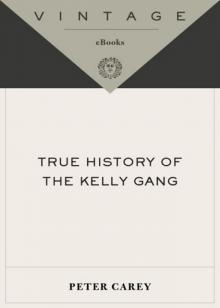 True History of the Kelly Gang
True History of the Kelly Gang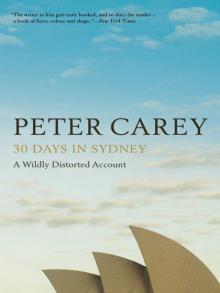 30 Days in Sydney: A Wildly Distorted Account
30 Days in Sydney: A Wildly Distorted Account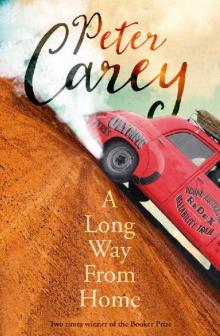 A Long Way From Home
A Long Way From Home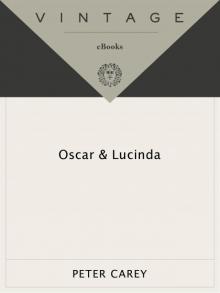 Oscar and Lucinda
Oscar and Lucinda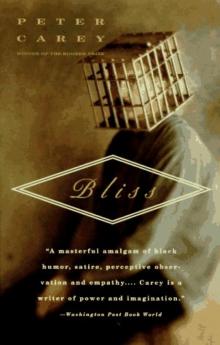 Bliss
Bliss Wrong About Japan
Wrong About Japan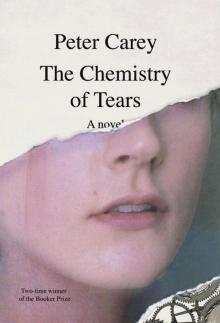 The Chemistry of Tears
The Chemistry of Tears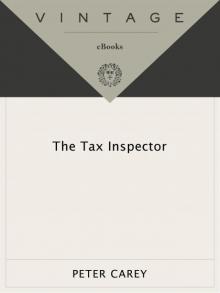 The Tax Inspector
The Tax Inspector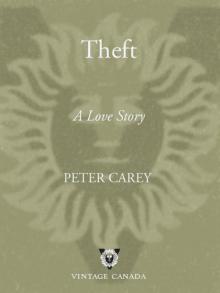 Theft: A Love Story
Theft: A Love Story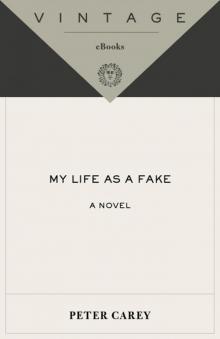 My Life as a Fake
My Life as a Fake Collected Stories
Collected Stories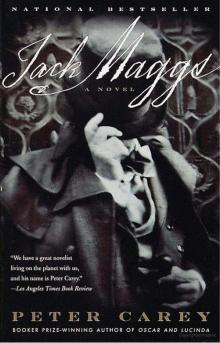 Jack Maggs
Jack Maggs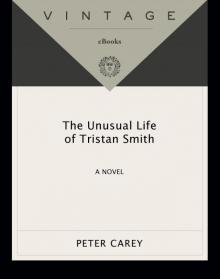 The Unusual Life of Tristan Smith
The Unusual Life of Tristan Smith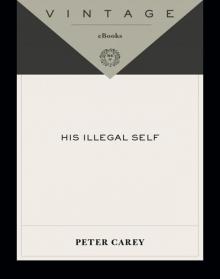 His Illegal Self His Illegal Self His Illegal Self
His Illegal Self His Illegal Self His Illegal Self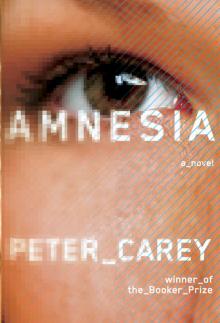 Amnesia: A Novel
Amnesia: A Novel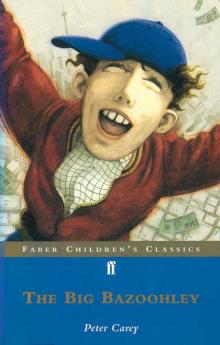 The Big Bazoohley
The Big Bazoohley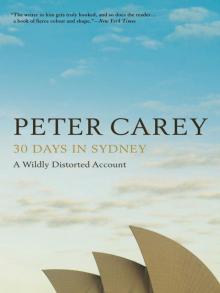 30 Days in Sydney
30 Days in Sydney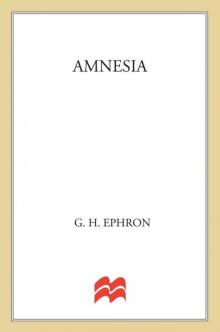 Amnesia
Amnesia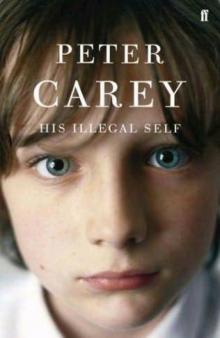 His Illegal Self
His Illegal Self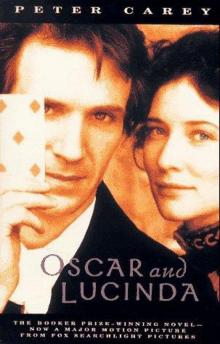 Oscar and Lucinda bw-1988
Oscar and Lucinda bw-1988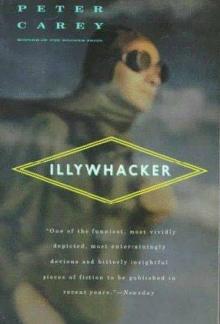 Illywhacker
Illywhacker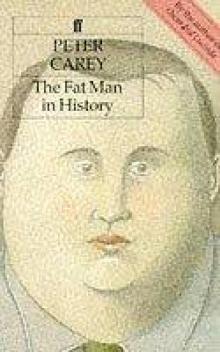 The Fat Man in History aka Exotic Pleasures
The Fat Man in History aka Exotic Pleasures